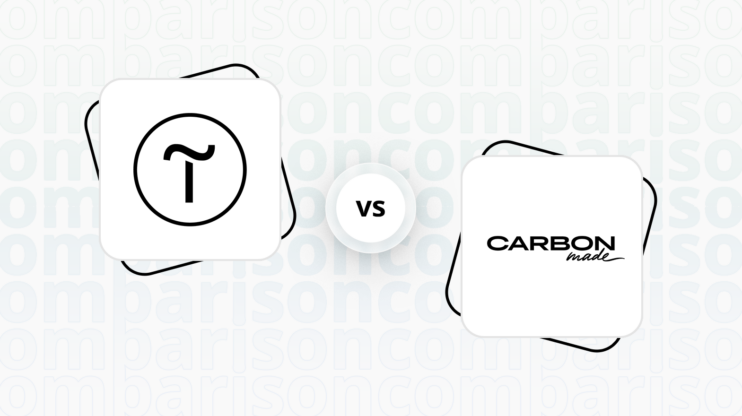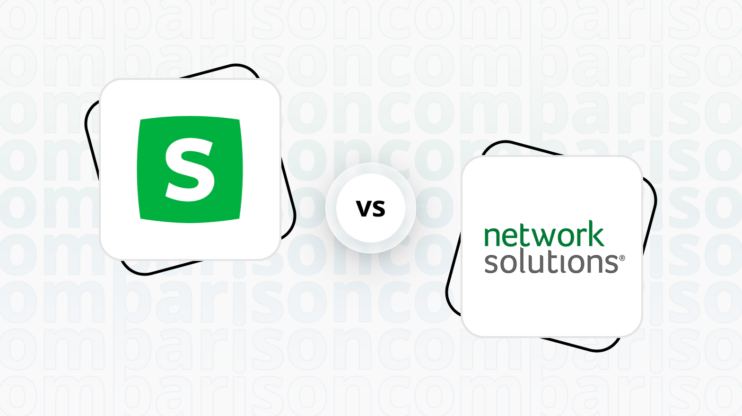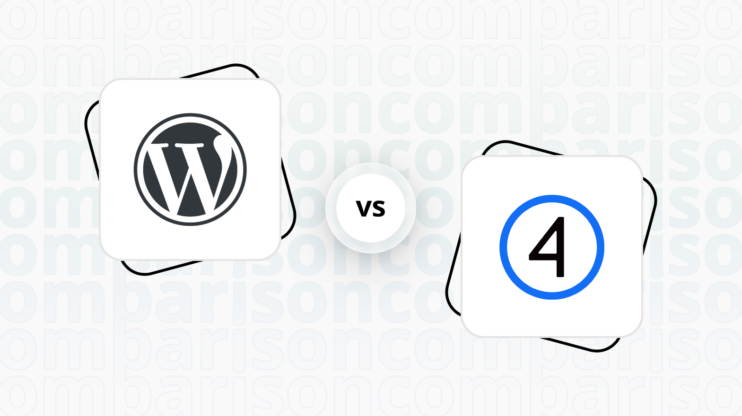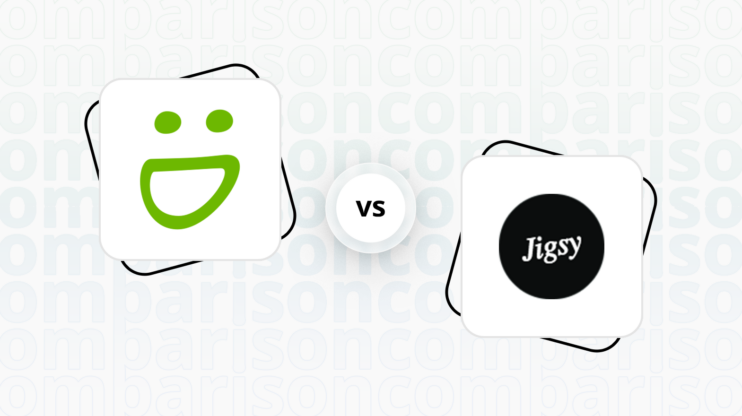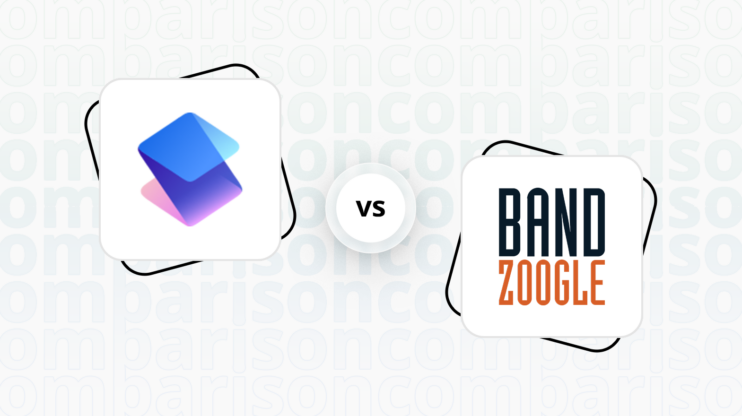Final verdict
Duda and Webnode both offer unique strengths, but they cater to different user needs and preferences.
-
Duda (Overall Grade: 7.8/10)
excels in providing a professional and responsive website building experience with a wide range of customizable templates and advanced features. It is particularly well-suited for agencies and designers who need to manage multiple client websites. Duda’s comprehensive ecommerce capabilities, robust hosting solutions, and strong customer support make it a versatile choice for businesses of all sizes. When comparing Duda vs Webnode, Duda stands out for its flexibility, design functionalities, and overall performance. -
Webnode (Overall Grade: 6.5/10)
is a user-friendly platform ideal for beginners who want to create simple websites quickly and easily. It offers a drag-and-drop interface, a variety of templates, and basic ecommerce features. While Webnode may not offer the same level of customization and advanced features as Duda, it provides a cost-effective solution for users with limited technical skills. In the Duda vs Webnode comparison, Webnode is a good option for those seeking an easy-to-use website builder with essential features.

|

|
|
|---|---|---|
|
Design functionalities & templates |
8.3 |
7.1 |
|
Ease of use |
8.4 |
8.0 |
|
Ecommerce |
7.4 |
6.3 |
|
Website editors |
8.3 |
7.3 |
|
Product testing options |
8.4 |
5.3 |
|
Price |
7.9 |
7.7 |
|
Hosting quality |
8.8 |
6.3 |
|
Website speed optimization |
7.6 |
6.1 |
|
Plugins/extensions and integrations |
7.7 |
6.8 |
|
Marketing features |
7.1 |
5.5 |
|
Customer support |
7.5 |
5.3 |
|
Website security |
8.6 |
7.7 |
|
AI capabilities |
7.3 |
5.3 |
|
User management |
8.0 |
6.9 |
Best for ecommerce
 7.4
7.4
 6.3
6.3
Verdict
: Duda is more suitable for businesses of all sizes with its comprehensive ecommerce features, while Webnode is better for simpler, smaller-scale online stores.
-
Duda
: Known for its robust ecommerce capabilities, Duda offers extensive tools for managing online stores, including product and inventory management, payment processing, and promotional tools. It is ideal for businesses looking for a scalable solution with advanced features. However, when comparing Duda vs Webnode, Duda’s extensive features might be more than what a small business needs. -
Webnode
: With a focus on simplicity, Webnode provides basic ecommerce features that are perfect for beginners and small-scale operations. It offers essential tools like shipping options, payment gateway integrations, and order management. However, it may lack the advanced functionalities required for larger, more complex ecommerce needs.
Best for informational & business websites
 8.4
8.4
 7.2
7.2
Verdict
: Duda is the superior choice for creating professional and responsive informational business websites, thanks to its extensive customization options and robust features. Webnode, while user-friendly and suitable for beginners, falls short in comparison to Duda’s comprehensive offerings.
-
Duda
: Duda excels in providing a wide range of customizable templates and features, making it ideal for creating professional and responsive informational websites. Its intuitive user interface, extensive design functionalities, and robust hosting solutions on AWS make it a top choice for businesses. Duda’s comprehensive approach to website speed optimization and strong security measures further enhance its appeal for informational business websites. With a score of 8.4, Duda stands out as a versatile and powerful platform. -
Webnode
: Webnode offers a user-friendly drag-and-drop interface, making it a good option for beginners looking to create simple informational websites quickly and easily. However, it lacks the depth and flexibility of Duda’s features. Webnode’s hosting quality and security measures are not as robust, and its customization options are more limited. With a score of 7.2, Webnode is suitable for those who prioritize ease of use over advanced functionalities when comparing Duda vs Webnode.
Detailed comparison
Design functionalities & templates
Design FunctionalitiesRepresents how well each platform allows for creative design and customization of websites.Score Components:
- Template Variety (30%): Range and quality of design templates.
- Customization (30%): Flexibility and options for design alterations.
- User Interface (20%): Ease and intuitiveness of the design process.
- Responsiveness (10%): Adaptability to different devices and screen sizes.
- Innovation (10%): Unique design features and tools.
 8.3
8.3
 7.1
7.1
🏆
Winner: Duda.
Duda offers a wider variety of templates and designs, more customization flexibility, and a higher Design Functionalities Templates score.
Duda offers a wide variety of templates and designs for its website builder. With over 180 templates to choose from, users have the flexibility to create a website that suits their unique needs and style. The templates are professionally designed and cover various industries, ensuring that businesses of all types can find a suitable option. Additionally, Duda allows users to customize the templates further, giving them the freedom to personalize their website’s design and layout.
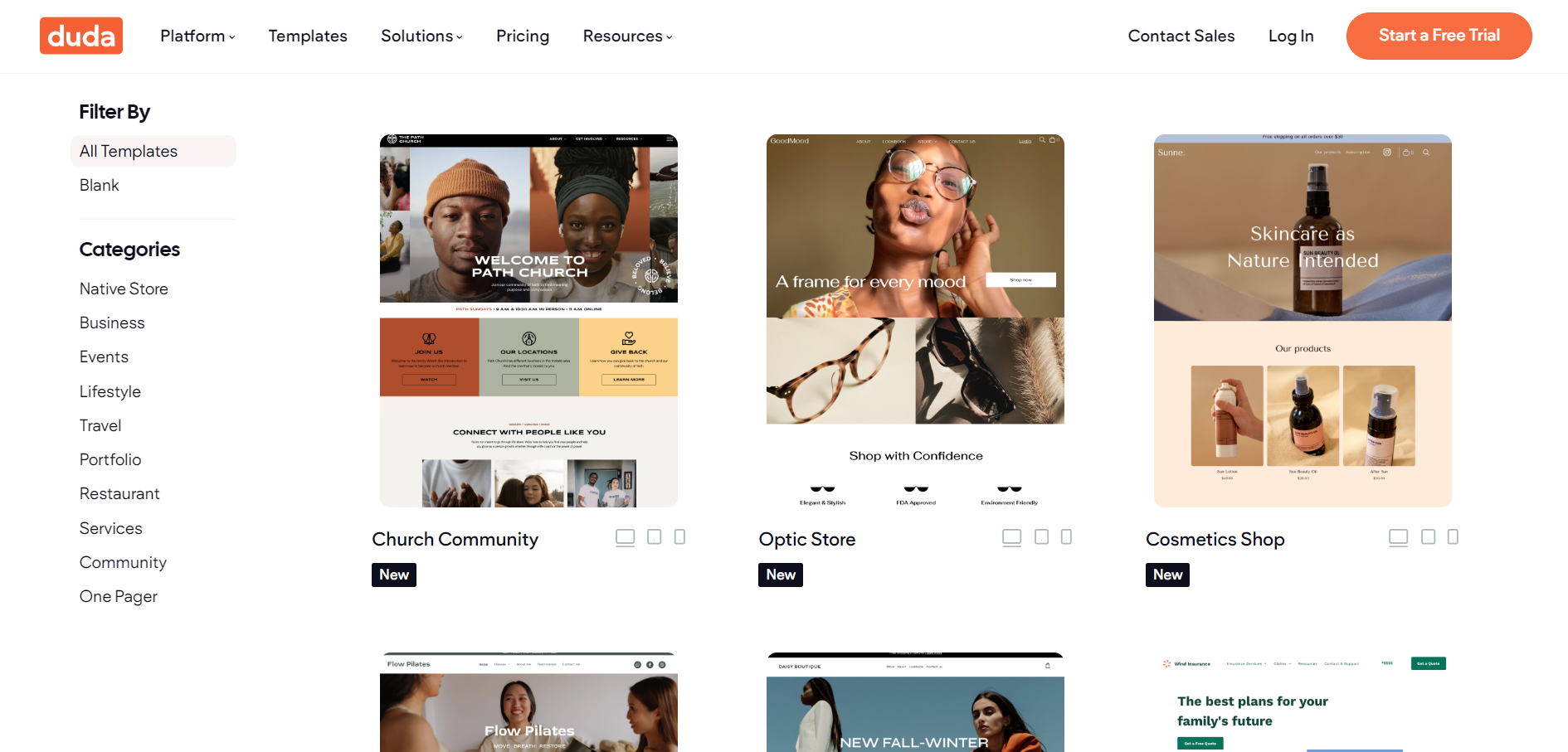

On the other hand, Webnode offers a variety of website templates designed for different purposes, from business and portfolios to restaurants and travel. These templates are customizable and responsive, ensuring they display well on any device. While an exact number isn’t available, Webnode provides a wide selection to cater to diverse website needs.
Get a head start on website creation with AI
Create a custom website tailored to your business needs 10X faster with 10Web AI Website Builder!
Ease of use
Ease of useReflects the platform’s overall user-friendliness.Score
Components:
- Learning curve (40%): Quickness and ease of getting started.
- Interface design (30%): Simplicity and intuitiveness of layout.
- User guidance (20%): Quality of tutorials and support.
- Flexibility (10%): Adaptability to various user skills.
 8.4
8.4
 8.0
8.0
🏆 Winner: Duda
. Scoring 8.4, Duda is praised for its intuitive user interface and a wide range of customizable templates, making it accessible for users of varying technical skill levels. Webnode, with a score of 8.0, offers a user-friendly website building platform, but its simplicity may limit customization options for those seeking more specific design visions.
Learning Resources
🏆 Winner: Duda
. Duda’s learning resources are comprehensive and high-quality, catering to both beginners and advanced users with a wide range of documentation, video tutorials, and an active community forum. Webnode offers a variety of learning resources, but the quality and accessibility of these resources may vary.
For ecommerce
EcommerceMeasures the platform’s effectiveness in supporting online business activities.Score Components:
- Ecommerce themes and templates (20%): Variety and design of templates.
- Product management (25%): Ease of managing and organizing products.
- Payment options (25%): Variety and convenience of payment methods.
- Ecommerce features (20%): Features for managing an ecommerce store.
- Integration (10%): Compatibility with external e-commerce tools and services.
 7.4
7.4
 6.3
6.3
Duda and Webnode both offer ecommerce capabilities, but they cater to different needs. Duda’s ecommerce features are more comprehensive, making it suitable for businesses of all sizes. It offers a range of tools for managing online stores, including product and inventory management, payment processing, shopping and tax settings, and promotional tools. Webnode, on the other hand, offers a simpler ecommerce solution with basic features like shipping options, payment gateway integrations, order management, and discounts.

|

|
|
|---|---|---|
|
Ecommerce themes and templates |
6.5 |
6.5 |
|
Product page customization |
7.5 |
7.0 |
|
Payment processing and commissions |
7.0 |
6.8 |
|
POS capabilities |
5.5 |
4.0 |
|
Payment gateways |
7.5 |
7.0 |
|
Product numbers |
7.0 |
5.5 |
|
Additional ecommerce features |
7.0 |
6.0 |
Duda ecommerce features:
- Product and Inventory management
- Payment processing
- Shopping and Tax settings
- Coupons and discounts
- SEO and Marketing tools
- Analytics and reporting
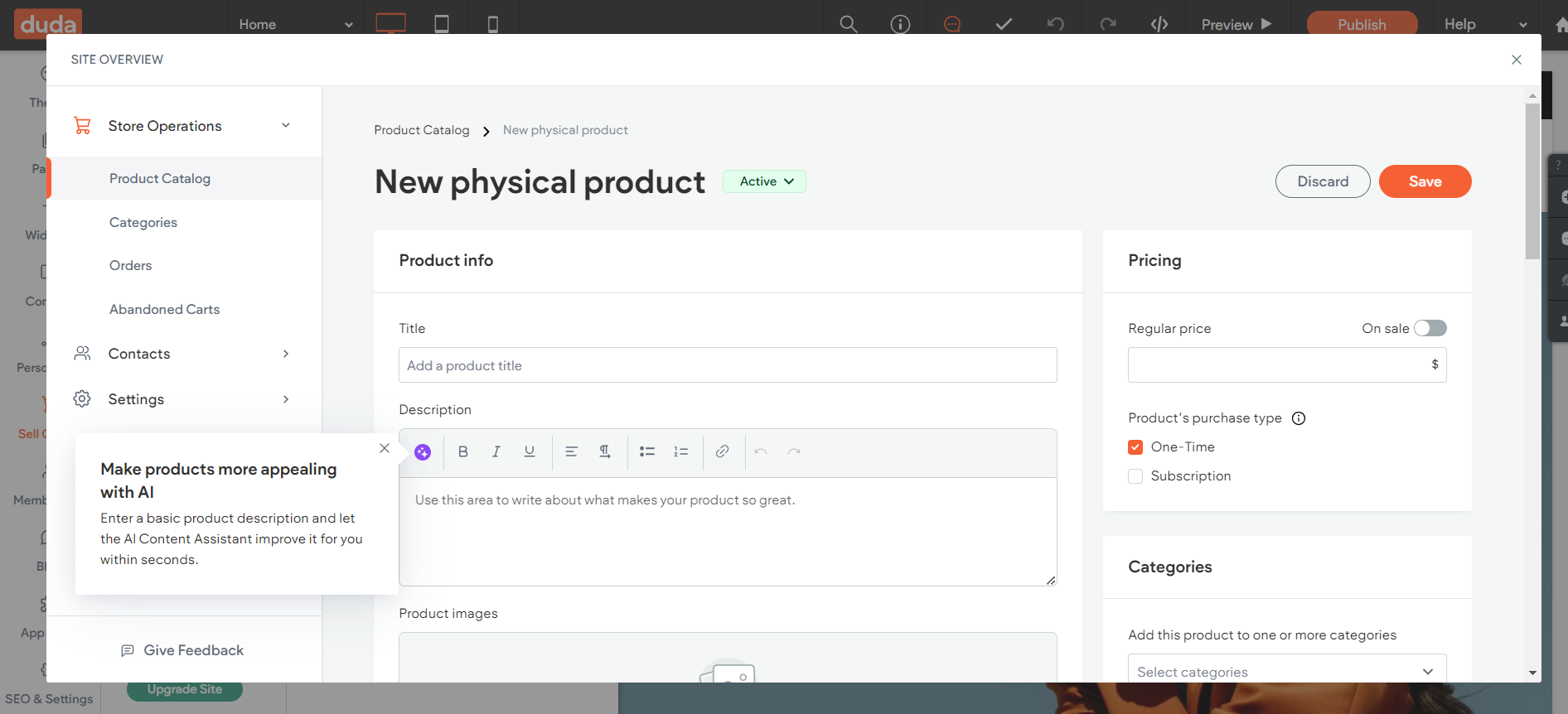
Webnode ecommerce features:
- Shipping options
- Payment gateway integrations
- Order management
- Coupons and discounts
Ecommerce themes & templates
Duda offers a small variety of ecommerce templates designed to help businesses create professional, responsive online stores. These templates are specifically tailored to support a wide range of ecommerce functionalities such as product catalogs, shopping carts, checkout processes, and payment gateways integration. On the other hand, Webnode offers ecommerce-specific templates designed for creating online stores, though the exact number of templates available may vary over time. These templates typically come with features such as product showcasing, shopping cart functionality, support for various payment gateways, and customization options.
Product page customization
Duda allows for easy addition of variations such as size and color directly from the product management section. It also offers bulk import/export functionality through CSV files, streamlining the process for managing large inventories. Webnode provides users with extensive customization options for product pages, allowing for the creation of visually appealing and informative displays. Through customizable content blocks, product images and galleries, and tailored product descriptions, users can effectively showcase their products.
Payment processing
Duda’s website builder integrates with Stripe and PayPal for payment processing, offering various methods like credit cards and AliPay. It also allows integration with third-party payment providers for flexibility and supports client billing using Stripe. Webnode website builder supports various payment gateways, including popular options like PayPal and Stripe, for online transactions. While Webnode itself doesn’t charge commissions on transactions, payment gateways may have their own fee structures. Webnode primarily focuses on facilitating online transactions and doesn’t provide native POS capabilities, although integration with third-party POS solutions may be possible.
Website Editors
Website EditorsEvaluates the platforms’ website building and editing capabilities.Score Components:
- Customization tools (40%): Range and power of editing features.
- Editor usability (30%): User experience within the editor.
- Design flexibility (20%): Freedom in layout and design changes.
- Update and maintenance ease (10%): Simplicity of updating and maintaining the site.
 8.3
8.3
 7.3
7.3
🏆
Winner: Duda
. Duda, with a score of 8.3, offers a user-friendly platform designed for creating responsive websites with ease. It features a drag-and-drop interface, a wide range of customizable templates, and integrated SEO and marketing tools. The platform also offers ecommerce capabilities, collaborative tools for client management, and ensures websites are optimized for all devices.
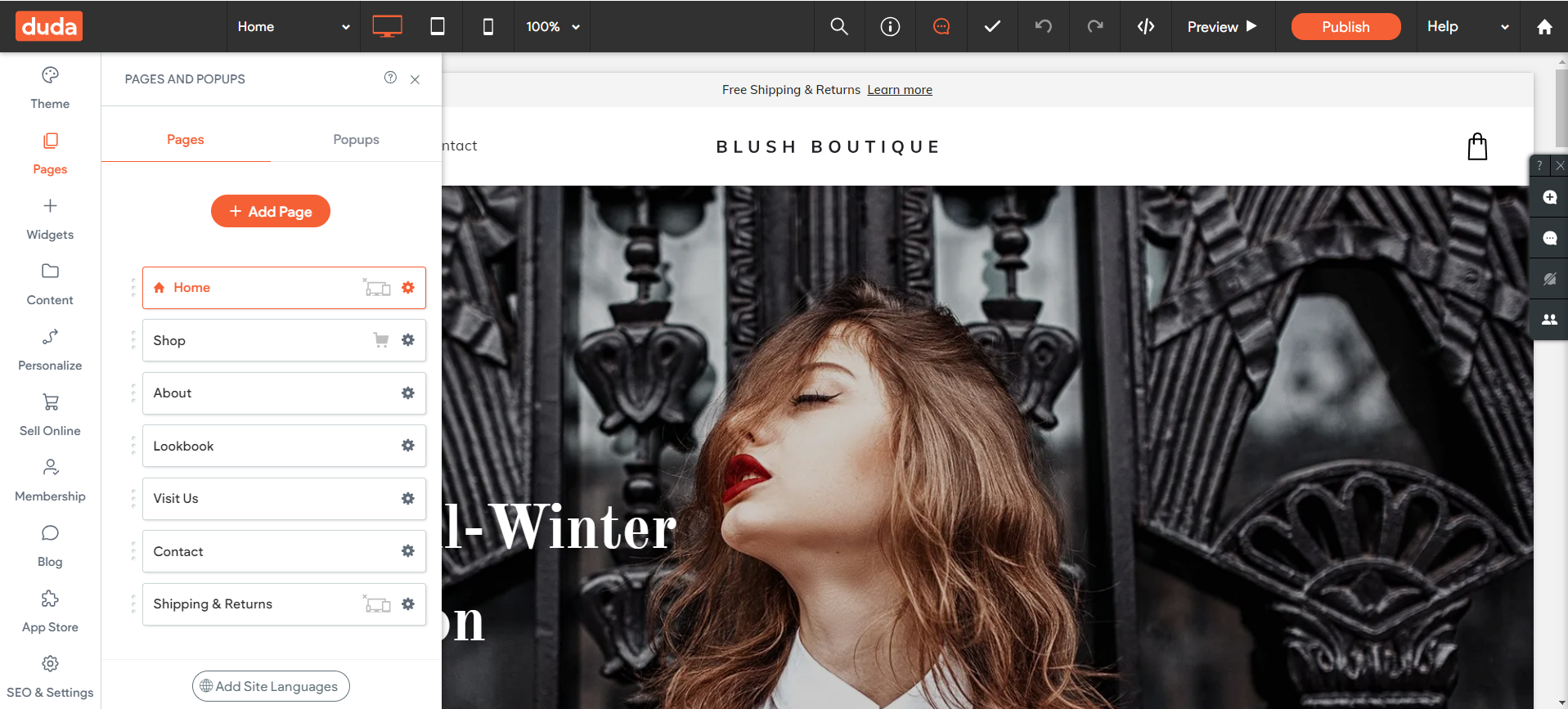
Webnode’s editor, scoring 7.3, features a user-friendly drag-and-drop interface with customizable templates, enabling users to easily create professional-looking websites without coding skills. The editor offers responsive design capabilities and multilingual support, catering to diverse audiences across different devices and languages.
Mobile editor/app
 5.5
5.5
 5.5
5.5


🏁
Draw: Duda and Webnode
. Both Duda and Webnode offer mobile editing capabilities, but neither of them have a dedicated mobile app for editing. This means that users can make changes to their websites on the go, but the editing experience may not be as smooth or feature-rich as it would be on a desktop.
Duda supports mobile editing through its platform, allowing users to make limited edits and republish sites directly from mobile devices. This can be convenient for making quick changes, but it may not be suitable for more complex edits or design work.
Webnode also allows users to edit their website using the mobile browser version of the editor. However, this comes with certain limitations, and the editing experience may not be as intuitive or user-friendly as it would be on a desktop.
In summary, both Duda and Webnode offer mobile editing capabilities, but the lack of a dedicated mobile app may limit the editing experience for users who prefer to work on their websites on the go.
Product testing options
Product Testing OptionsAssesses the options for trying out platform features before commitment.Score Components:
- Trial quality (40%): Extent and usefulness of the trial or free version.
- Feature accessibility (30%): How many features are available to test.
- Trial duration (20%): Length of the trial period.
- Ease of transition (10%): Smoothness of moving from trial to paid plans.
 8.4
8.4
 5.3
5.3
Overall Result
:
Duda Wins
. Duda scores 8.4 in product testing options, significantly higher than Webnode’s 5.3. Duda offers a 14-day free trial during which all features of each plan can be tested. In contrast, Webnode does not offer a trial version, and only some features can be tested with the free plan. Duda also offers a longer money-back guarantee period of 30 days compared to Webnode’s 15 days.

|

|
|
|---|---|---|
|
Free Plan |
No | Yes |
|
Trial Duration |
14 days | No |
|
Testing Premium Features |
All features during free trial |
Some features with the free plan |
|
Money Back Guarantee |
30 days | 15 days |
Price
PriceLooks at the cost-effectiveness and value for money of each platform.Score Components:
- Plan value (40%): What each pricing tier offers.
- Transparency and clarity (30%): Clearness of pricing structures.
- Flexibility of plans (20%): Range of options to suit different budgets.
- Hidden costs (10%): Additional expenses not included in the plan.
 7.9
7.9
 7.7
7.7
Duda and Webnode have similar price scores, with Duda slightly ahead. Duda offers a range of plans including a white label option for agencies and designers, while Webnode offers a variety of plans suitable for different needs from basic websites to comprehensive e-commerce. Duda also offers an Enterprise plan for larger businesses or organizations requiring advanced features, customization, and support, while Webnode does not have an enterprise plan.

|

|
|
|---|---|---|
|
$0-$10 |
No offering at this amount. |
LIMITED ($5.50/month): Basic plan, 200 MB storage, attach domain, website statistics, up to 5 form fields, last 30 days backup. This plan allows to manage 1 website with unlimited number of pages. Value for price: 3.0 |
|
$10-$20 |
No offering at this amount. |
MINI ($10.00/month): All essentials for a simple website, 1 GB storage, 3 GB bandwidth, website statistics, 1 email account. This plan allows to manage 1 website with unlimited number of pages. Value for price: 4.5 |
|
$20-$30 |
No offering at this amount. |
STANDARD ($16.90/month): For starting an online store, 3 GB storage, 10 GB bandwidth, 20 email accounts, basic store features. This plan allows to manage 1 website with unlimited number of pages. Value for price: 6.0 |
|
$30-$40 |
Basic ($25/month): Includes hosting for one website with email support, 99.99% uptime, and access to Duda’s AI Content Assistant. Value for price: 6.0 |
PROFI ($26.50/month): Professional websites, 7 GB storage, unlimited bandwidth, 100 email accounts, full online store capabilities. This plan allows to manage 1 website with unlimited number of pages. Value for price: 7.5 |
|
$60-$70 |
Team ($39/month): Adds up to three team members, priority email, chat, and phone support, with team and client management features. Value for price: 7.0 |
BUSINESS ($34.90/month): Comprehensive e-commerce, 15 GB storage, unlimited bandwidth, 1000 email accounts, advanced online store features. This plan allows to manage 1 website with unlimited number of pages. Value for price: 8.5 |
|
$100+ |
Agency ($69/month): Offers hosting for up to four websites with priority support, account management, and access to advanced features. Value for price: 8.0 |
No offering at this amount. |
location. As a result in rare cases the prices displayed here can differ from the ones you see on their
websites.
Hosting quality
Hosting
qualityExamines the reliability and performance of the hosting solutions.Score Components:
- Uptime (40%): Consistency and reliability of website availability.
- Speed (30%): Loading times and performance.
- Bandwidth and storage (20%): Sufficiency of resources provided.
- Data centers (10%): Quality and distribution of hosting infrastructure.
 8.8
8.8
 6.3
6.3
Winner: Duda
. Duda offers robust hosting solutions on Amazon Web Services (AWS) with high speed, no storage or bandwidth limitations, and a 99.99% uptime guarantee. Webnode, on the other hand, does not disclose its hosting type or the locations of its data centers, and does not offer an uptime guarantee, which results in a lower Hosting Quality score.

|

|
|
|---|---|---|
|
Do they offer hosting? |
Yes |
Yes |
|
Data Centers: |
AWS |
Not disclosed |
|
Type of hosting: |
AWS Cloud Hosting |
Not disclosed |
|
Uptime: |
99.99% |
99.6% |
|
Uptime Guarantee: |
Yes, 99.99% |
No |
Website Speed Optimization
Website Speed OptimizationEvaluates optimization of website loading timesScore Components:
- PageSpeed Score (30%): Google’s score indicating performance optimization.
- Loading Time (30%): The average time until a website is fully interactive.
- Mobile Optimization (15%): Optimization effectiveness for mobile devices.
- Resource Optimization (15%): Optimizing images, scripts, and other heavy resources.
- CDN Usage (10%): Use of CDN to enhance speed across geolocations.
 7.6
7.6
 6.1
6.1
🏆 Winner: Duda
Both Duda and Webnode have strategies in place for website speed optimization, but Duda’s comprehensive approach and emphasis on Core Web Vital improvements give it the edge.

|

|
|
|---|---|---|
|
Focus |
Efficient Code and File Minification, CDN, Image Optimization, Mobile-Responsive Designs and AMP Support |
Code Minification, Image Optimization, Caching |
|
Performance Tools |
Google Lighthouse, PageSpeed Insights |
Google PageSpeed Insights |
|
Key Strategies |
Efficient Code and File Minification, CDN, Image Optimization, Mobile-Responsive Designs and AMP Support |
Code Minification, Image Optimization, Caching |
|
Load Times |
Varies widely, depending on the optimization and user’s location |
Varies depending on optimization |
|
Page Speed Scores Range |
Varies widely, depending on the optimization and user’s location |
Varies depending on optimization |
|
Core Web Vitals Improvement |
Emphasis on LCP, FID, CLS improvements |
No information provided |
Duda’s approach to website speed optimization includes efficient code and file minification, use of a content delivery network (CDN), image optimization, and mobile-responsive designs. They also support Accelerated Mobile Pages (AMP) for faster mobile page loads. Duda places a strong emphasis on improving Core Web Vitals, including Largest Contentful Paint (LCP), First Input Delay (FID), and Cumulative Layout Shift (CLS). However, both load times and PageSpeed scores can vary widely, depending on the level of optimization and the user’s location.
Webnode, on the other hand, focuses on code minification, image optimization, and caching for speed optimization. However, they do not provide any information on their Core Web Vitals improvements. Like Duda, Webnode’s load times and PageSpeed scores can vary depending on the level of optimization.
Get a head start on website creation with AI
Create a custom website tailored to your business needs 10X faster with 10Web AI Website Builder!
Plugins and integrations
Plugins and integrationsMeasures the range and effectiveness of additional plugins and integrations.Score Components:
- Variety of options (40%): Range of available add-ons.
- Integration smoothness (30%): Ease of integrating plugins into the site.
- Quality of plugins (20%): Functionality and reliability of the options.
- Custom integration capabilities (10%): Support for custom or third-party integrations.
 7.7
7.7
 6.8
6.8
🏆 Winner: Duda.
With a score of 7.7, Duda offers a more comprehensive set of plugins and integrations compared to Webnode, which scores 6.8. Duda’s built-in widgets and app integrations, along with the ability to create custom widgets, provide users with a wide range of options to enhance their websites. Webnode, on the other hand, relies on Elfsight for its plugins, which also cover a wide range of applications but may not offer the same level of customization as Duda.
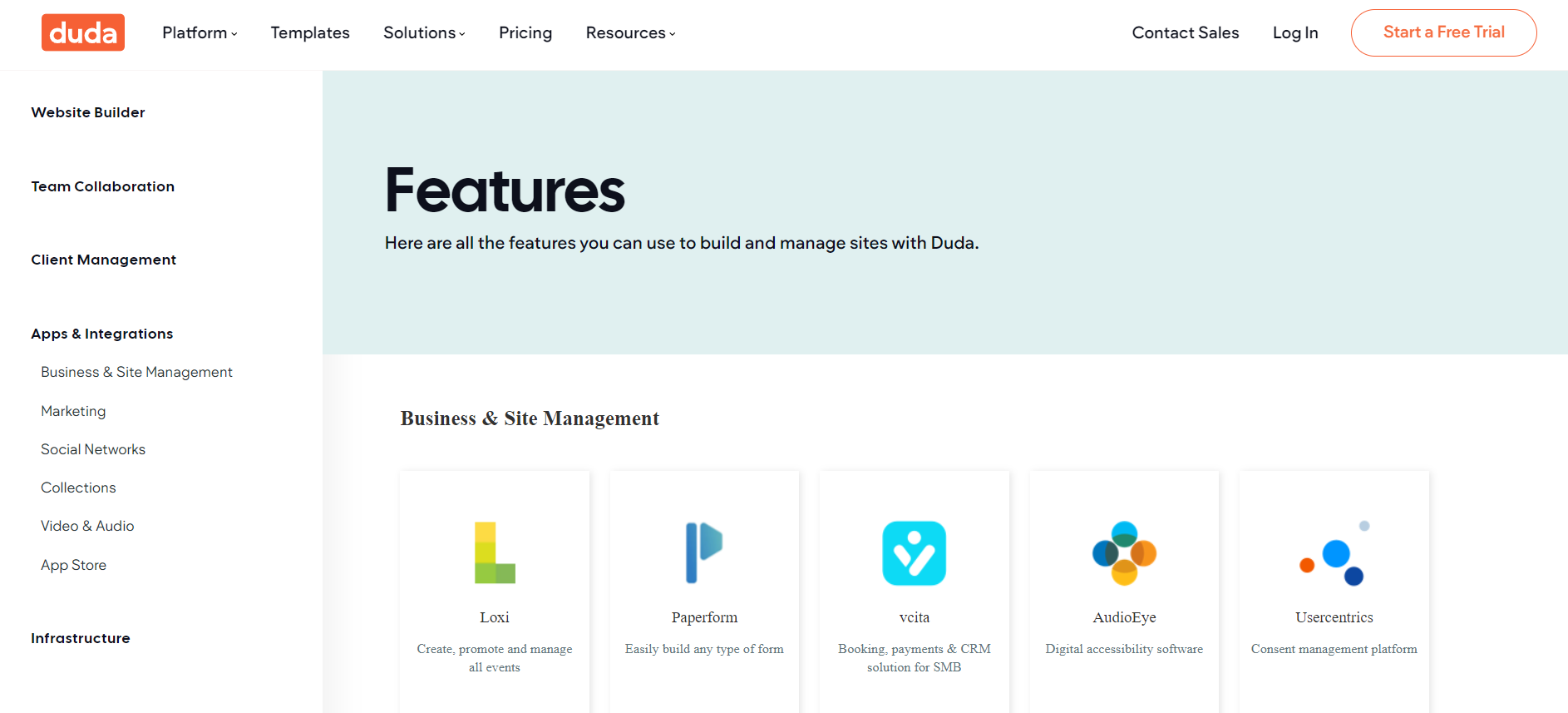

Marketing Features
Design FunctionalitiesRepresents how well each platform allows for creative design and customization of websites.Score Components:
- Template Variety (30%): Range and quality of design templates.
- Customization (30%): Flexibility and options for design alterations.
- User Interface (20%): Ease and intuitiveness of the design process.
- Responsiveness (10%): Adaptability to different devices and screen sizes.
- Innovation (10%): Unique design features and tools.
 7.1
7.1
 5.5
5.5
🏆
Overall Winner: Duda
. Duda stands out for its comprehensive SEO tools, integration with third-party email marketing platforms, and support for Google Analytics. Webnode, while offering a range of features, lacks in-depth analytics and email marketing capabilities.

|

|
|
|---|---|---|
|
SEO Tools |
|
|
|
Email Marketing |
Through integration of third party platforms such as Mailchimp |
|
|
Blogging |
|
|
|
Social Media Integration |
|
Yes, through third party integration |
|
Analytics and Reporting |
Supports Google Analytics for comprehensive web traffic and behavior analysis |
|
|
Ads and Promotions |
Personalization tools for promotions, lacking direct marketing automation tools |
|
Customer Support
Customer supportEvaluates the quality and availability of support options.Score Components:
- Response time (40%): Speed of support responses.
- Support quality (30%): Effectiveness and helpfulness of the support.
- Availability (20%): Range of support channels (phone, chat, email).
- Resource richness (10%): Quality of self-help and educational materials.
 7.5
7.5
 5.3
5.3
🏆 Winner: Duda
. In the Duda vs Webnode comparison, Duda takes the lead with its more comprehensive support options. Duda offers 24/5 support through email and live chat for its Team and Agency plans, with additional support options available for Enterprise customers. This includes priority email, chat, and phone support, as well as dedicated account management and ongoing training.
Webnode, on the other hand, provides customer support in over 20 languages, primarily through email with a 24-hour response time during weekdays. Premium customers receive priority phone support, but live chat is not generally available. While Webnode’s support is adequate for basic needs, it lacks the extensive support options and availability that Duda offers, making Duda the better choice for users seeking robust customer support.
Security
SecurityLooks at the platforms’ security measures and data protection.Score Components:
- Data protection (40%): Safeguards for user and customer data.
- SSL and encryption (30%): Implementation of secure connections.
- Compliance (20%): Adherence to industry security standards.
- Regular updates (10%): Frequency of security updates and patches.
 8.6
8.6
 7.7
7.7
🏆
Winner: Duda
. Duda’s security measures are comprehensive and integrated into the platform. They include automatic SSL certificates for encryption, a Web Application Firewall (WAF) for filtering and monitoring HTTP traffic, DDoS protection, regular updates and patches, secure hosting, two-factor authentication (2FA), access controls, backup and recovery options, and monitoring with alerts. Duda also adheres to global standards like GDPR and provides tools to support GDPR compliance.
Webnode also prioritizes security, offering a Premium Site Security add-on with IP Filters, Form Protection, and Malware Scanning for users with a Premium Plan. All Webnode sites are automatically secured with HTTPS, ensuring safe browsing for visitors. However, compared to Duda, Webnode’s security measures seem less comprehensive.
AI Capabilities
AI capabilitiesMeasures the effectiveness of AI-driven features and tools.Score Components:
- Automation efficiency (40%): Impact of AI on streamlining processes.
- Personalization (30%): AI-driven customization for users or customers.
- AI-Assisted design (20%): Role of AI in website design and functionality.
- Data analysis (10%): Use of AI in interpreting user data and analytics.
 7.3
7.3
 5.3
5.3

|

|
|
|---|---|---|
|
AI Builder |
|
Webnode AI builder generates custom websites based on user needs |
|
AI Ecommerce Features |
AI Assistant for product descriptions and automated marketing |
|
|
AI Content Generation |
AI tools for content generation and SEO optimization |
|
|
Additional AI Features |
AI Content Assistant, AI SEO Assistant, AI-generated alt text |
|
🏆 Winner: Duda
. Despite not having an AI builder, Duda’s AI capabilities are more comprehensive, with a score of 7.3. Duda’s AI features focus on content generation, SEO optimization, and ecommerce, providing a range of tools to streamline website creation and management.
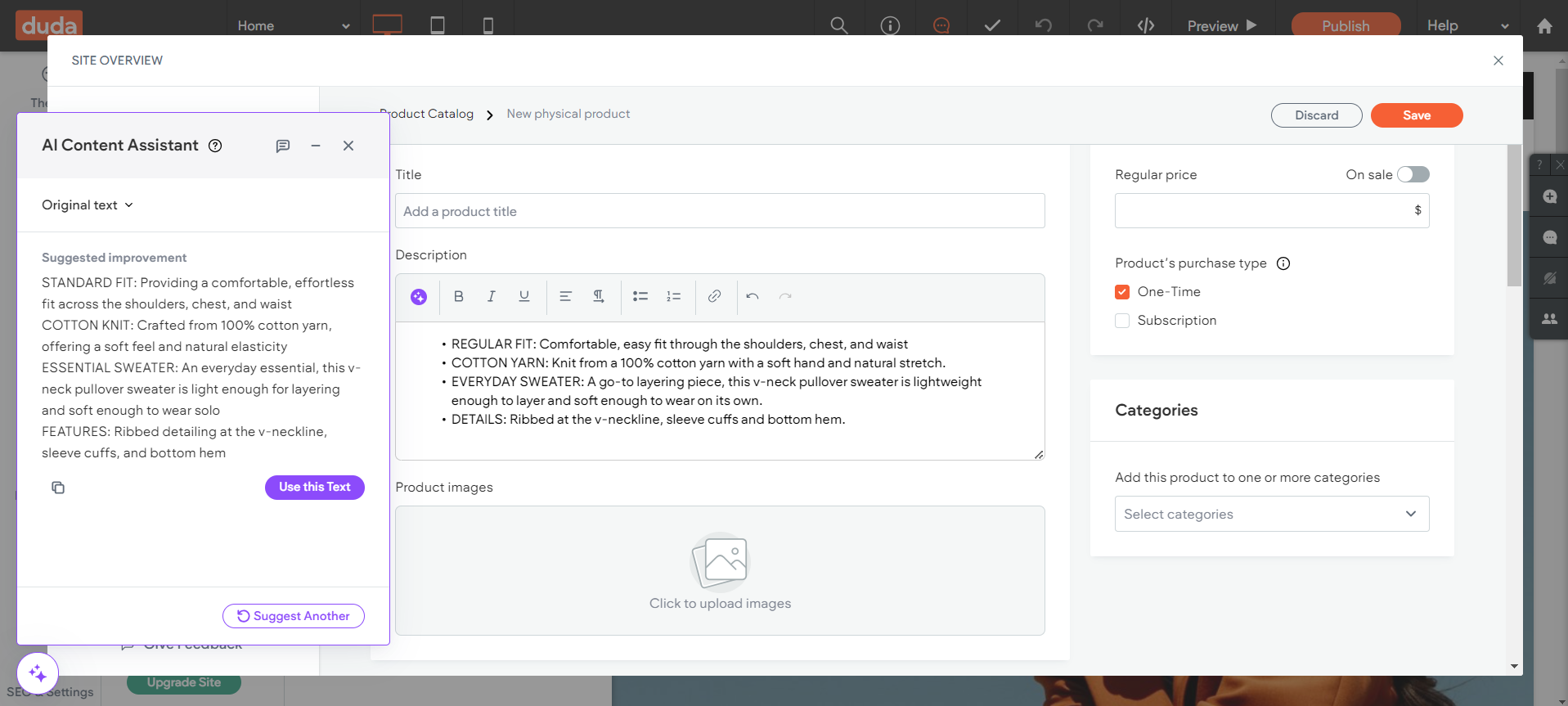
Webnode, with a score of 5.3, only offers an AI assisted builder and does not have any other AI features. This makes it less versatile compared to Duda in terms of AI capabilities.
User Management
User ManagementAssesses the platforms’ capabilities in managing user roles, permissions, and accessibility.Score Components:
- Role Customization (40%): Flexibility in creating and defining user roles and
permissions. - Ease of Management (30%): User interface and tools for managing users.
- Access Control (20%): Effectiveness of access control measures for different user
levels. - Scalability (10%): Ability to manage a growing number of users efficiently.
 8.0
8.0
 6.9
6.9
🏆 Winner: Duda
. Both Duda and Webnode allow for collaborative website management, with the number of users and permissions varying by subscription plan.
- Duda enables more users to participate in higher-tier plans, offering roles like Owner/Administrator, Designer, Content Editor, and Developer, each with distinct access levels. Some plans also allow for the creation of custom roles, providing flexibility in team management.
- Webnode, on the other hand, provides limited user access for management and editing in the free version, while premium plans offer more flexibility, including the ability to add multiple users with different roles and permissions.
Webnode User Roles and Access Levels:
| Role | Description | Access Highlights |
|---|---|---|
| Website Owner | The individual or entity that owns the Webnode website. | Full access: can modify site structure, design, content, and manage user roles. |
| Administrator | Users with administrative privileges assigned by the website owner. | Nearly full access, including content management, and some settings adjustments. |
| Editor | Users tasked with creating, editing, and publishing content. | Access to add and edit content, blog posts, and pages, but cannot alter design. |
| Contributor | Users who can contribute content but cannot publish it. | Can draft content but need approval from an Editor or Administrator to publish. |
| Viewer/Visitor | Individuals who visit the website without any editing permissions. | Can view the public website and interact through comments or contact forms. |
| E-commerce Manager | Specifically for websites with an e-commerce component, managing products. | Can add, edit, and manage products, orders, and customer interactions. |
Additional Features

|

|
|
|---|---|---|
|
SSL Certificate |
|
|
|
Custom Domain |
|
|
|
Free Custom Domain Included |
|
|
|
International Domains |
|
|
|
Mobile Responsive |
|
|
|
Page Speed |
|
|
|
Website Builder Mobile App |
|
|
|
Convert a Website To An App |
|
|
|
Website Analytics |
|
|
|
Multilingual Sites |
|
|
|
Multiple Users |
|
|
User Feedback
Duda garners positive reviews for its user-friendly interface, extensive customization options, and responsive customer support. Users appreciate its drag-and-drop features, diverse integrations, and ability to cater to both novices and experienced developers. However, some note complexities with certain features like Duda Flex and occasional inconsistencies in design. Despite this, Duda remains a valuable tool for quick and efficient website development and management, offering a balance of ease-of-use and customization.
User feedback on Webnode highlights its ease of use, rapid website creation capabilities, and the wide range of templates available, making it a popular choice for individuals and businesses seeking an intuitive web development platform. While praised for its user-friendly interface and quick setup, including domain purchase and application, some users express a desire for more flexibility and customization options, especially in themes and e-commerce features. Comparatively, it falls short on advanced functionalities such as SEO tools and widgets offered by competitors like WordPress. Customer service experiences vary, with some users facing challenges in getting support for email hosting and analytics integration. Overall, Webnode is celebrated for its ability to accommodate users with little to no coding knowledge, offering an accessible solution for creating professional websites, though it may not fully meet the needs of those requiring more complex site features or dedicated customer support.
The making of this blog
We followed a clear, step-by-step process to write and research this article.
FAQ
Which platform is better for beginners, Duda or Webnode?
Can I use both Duda and Webnode for ecommerce?
How do Duda and Webnode differ in terms of customization and design flexibility?
What are the major differences in pricing between Duda and Webnode?
Which platform offers better customer support, Duda or Webnode?
Are Duda and Webnode secure platforms for building a website?
Which platform is better for SEO and marketing features, Duda or Webnode?
Can I manage multiple users and roles on Duda and Webnode?











